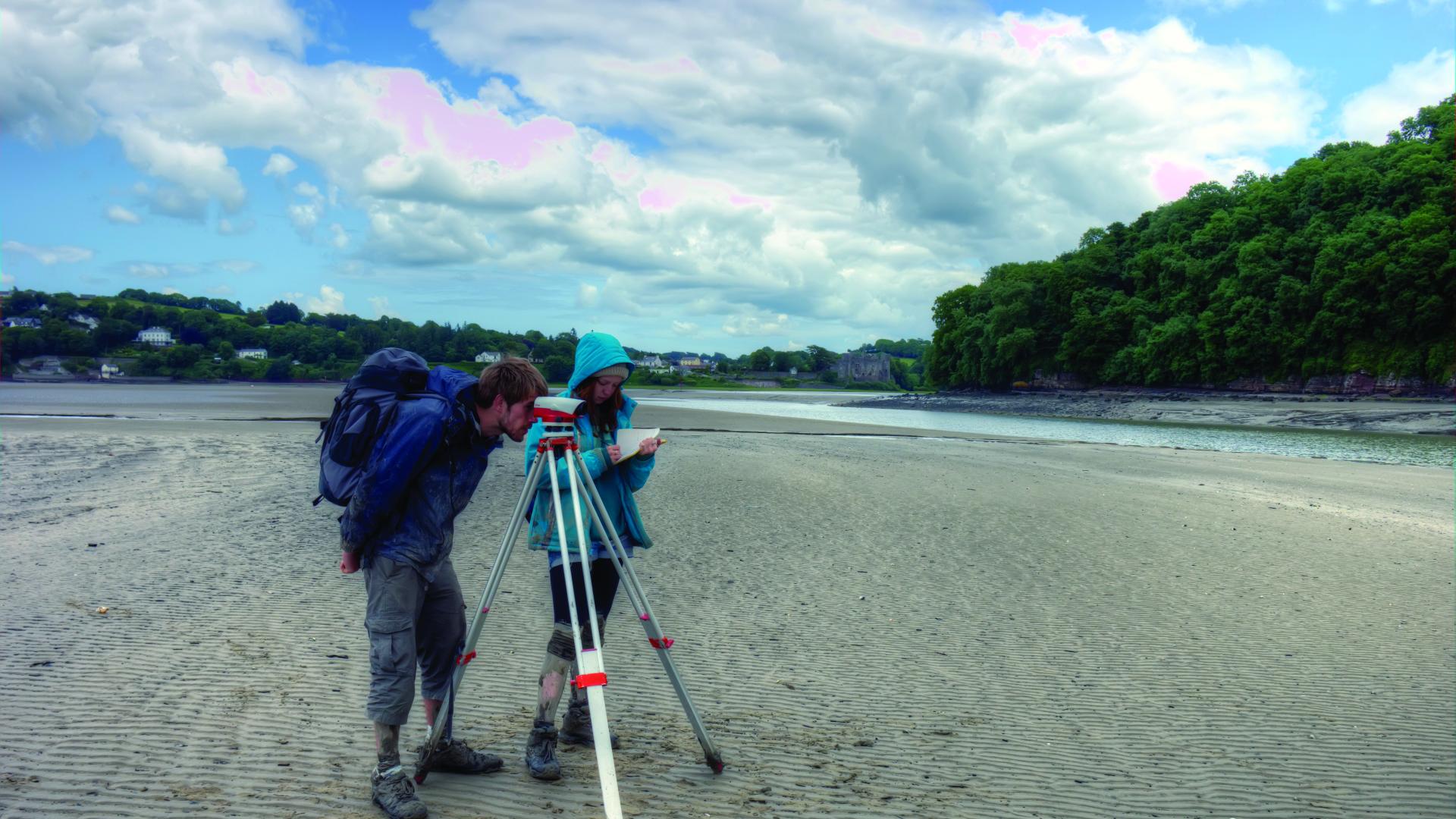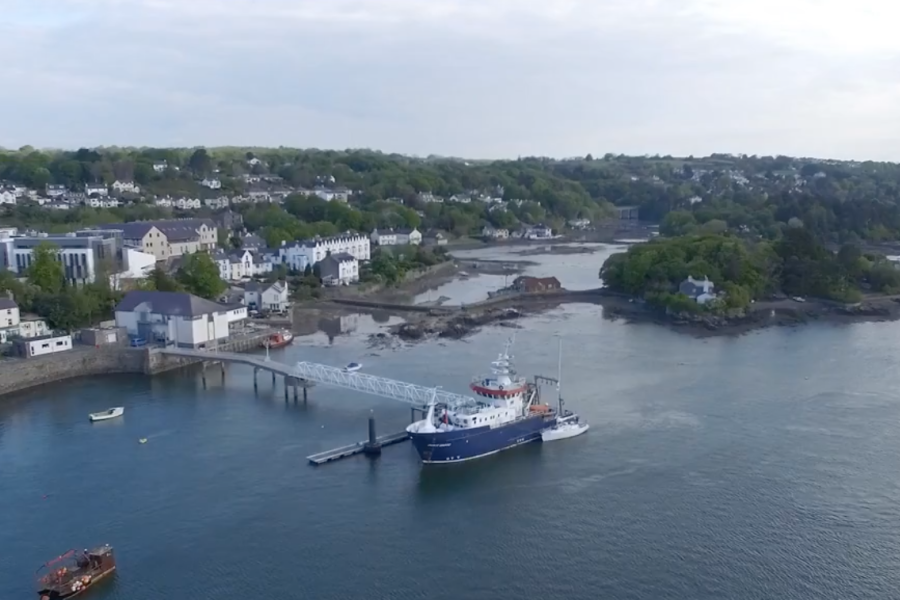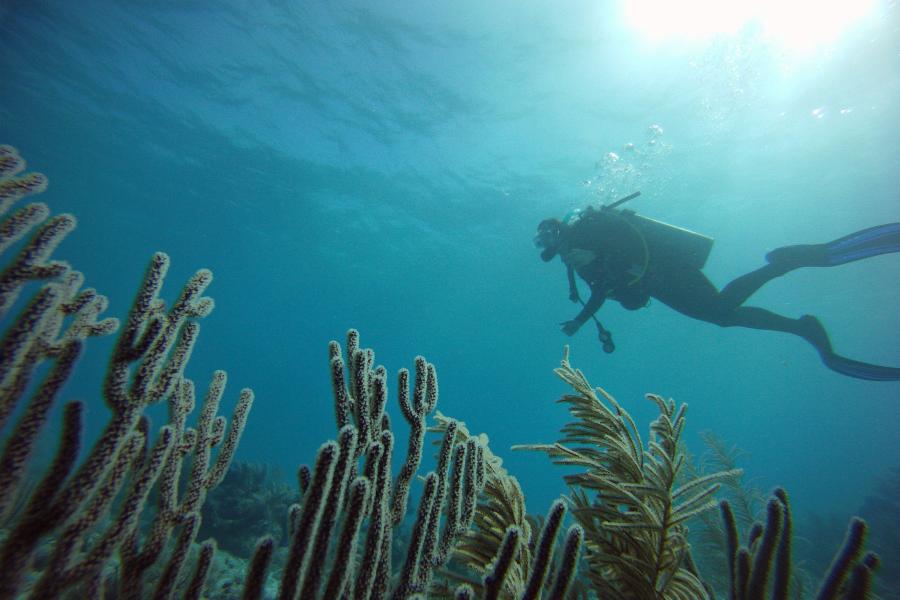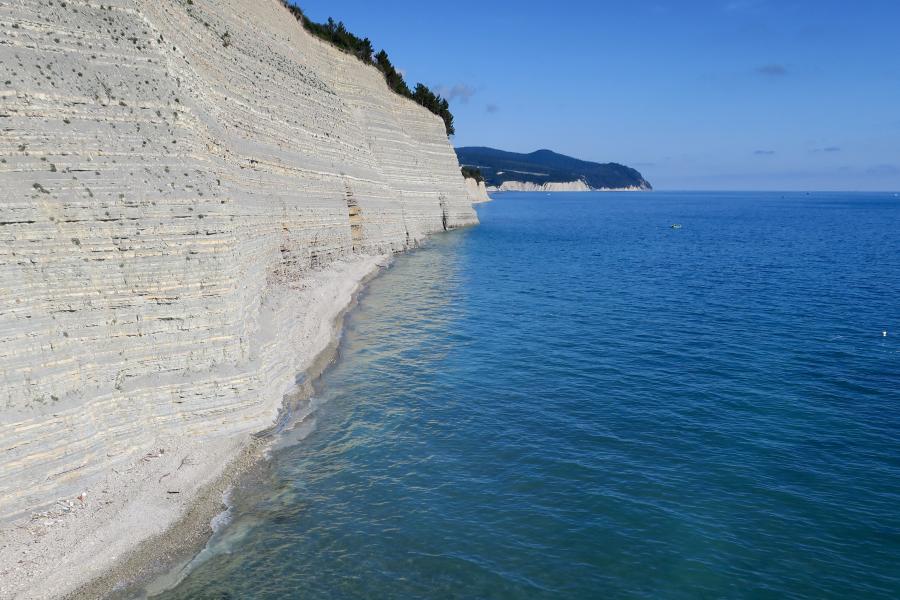About This Course
Like its BSc counterpart, this four year degree focuses on the study of marine sediments within an Earth system science context. You will learn about sedimentary processes the origin, transport and deposition of particles in the marine environment, and marine sediments and rocks, in particular those formed in the past 2 million years, but also further back in time. This MSci differs from the BSc course as it places emphasis on gaining skills and knowledge of direct relevance to the offshore survey and hydrocarbon industry.
Geological Oceanographers are required to tackle issues such as offshore site investigation related to renewable energy infrastructure and oil and gas exploration, climate and sea-level change, and coastal erosion. These are challenging and buoyant areas of development; there is currently a lack of qualified people for these roles. After graduation, you will not only have a deep understanding of the ‘earth system’, but you will also have a broad range of practical skills in sedimentology, geophysics and geotechnics. The data integration skills we teach on this degree are in short supply in the offshore industry, this means you will have a good chance of getting a great job after you finish your degree.
We are one of the largest university centres teaching marine sciences in the UK and among the biggest in Europe.
The geologists on our staff have expertise in the relevant subject areas and we have strong links with the offshore and hydrocarbon industry.
We are unique in the UK in offering the sedimentology / geophysics / geotechnics combination of subject areas – and the School of Ocean Sciences is very well recognized amongst practicing professionals as providing high quality employees to the offshore sector.
Why choose Bangor University for this course?
- Our expertise covers all aspects of the marine sciences, with strengths in physical oceanography and the geosciences. Local fieldwork takes place in the UNESCO designated GeoMôn geopark, Snowdonia National Park, the Menai Strait and the Irish Sea.
- Facilities include a research ship, supercomputers and state-of-the art survey equipment and oceanographic moorings for data collection.
- Our global links include the National Oceanography Centre, the Met Office, and the offshore, hydrocarbon and marine renewables industries.
- This degree places emphasis on gaining skills and knowledge that will be useful to industry.
Additional Course Options
This course is available with a Placement Year option where you will study for 1 additional year. The Placement Year is undertaken at the end of the second year and students are away for the whole of the academic year.
The Placement Year provides you with a fantastic opportunity to broaden your horizons and develop valuable skills and contacts through working with a self-sourced organisation relevant to your degree subject. The minimum period in placement (at one or more locations) is seven calendar months; more usually you would spend 10-12 months with a placement provider. You would normally start sometime in the period June to September of your second year and finish between June and September the following year. Placements can be UK-based or overseas and you will work with staff to plan and finalise the placement arrangements.
You will be expected to find and arrange a suitable placement to complement your degree and will be fully supported throughout by a dedicated member of staff at your academic School and the University’s Careers and Employability Services.
You will have the opportunity to fully consider this option when you have started your course at Bangor and can make an application for a transfer onto this pathway at the appropriate time. Read more about the work experience opportunities that may be available to you or, if you have any questions, please get in touch.
This course is available with an International Experience Year option where you will study or work abroad for 1 additional year. You will have ‘with International Experience’ added to your degree title on graduating.
Studying abroad is a great opportunity to see a different way of life, learn about new cultures and broaden your horizons. With international experience of this kind, you’ll really improve your career prospects. There are a wide variety of destinations and partner universities to choose from. If you plan to study in a country where English is not spoken natively, there may be language courses available for you at Bangor and in your host university to improve your language skills.
You will have the opportunity to fully consider this option at any time during your degree at Bangor and make your application. If you have any questions in the meantime, please get in touch.
Read more about the International Experience Year programme and see the studying or working abroad options on the Student Exchanges section of our website.
Course Content
This course involves up to 25-35 hours per week of lectures, practicals laboratory and fieldwork, private study, tutorials and project work. You will also complete literature reviews, exercises, essays, practical and field-work write-ups and your own research. In the final year you will work on a practical research project throughout both semesters. Practical work is an important element and includes free day trips as well as the residential field course in South Wales.
In the third and final years, you will be invited to a series of guest lectures, and often interviews with prospective employees; and be offered trips to various national industry meetings (e.g. oceanology, ocean business).
Modules for the current academic year
Module listings are for guide purposes only and are subject to change. Find out what our students are currently studying on the Geological Oceanography MSci Modules page.
Course content is for guidance purposes only and may be subject to change.
Facilities
Ocean Sciences facilities
- Our excellent teaching facilities include geophysical labs and wave flumes, as well as advanced computer systems.
- We are on the coast, next to the Irish Sea and the Menai Strait within the UNESCO Geopark GeoMon. We are also next to the classic glaciated environments of Snowdonia and so the perfect place to study geosciences with a wide range of environments for field courses and study sites for final-year projects.
- We have a £3.5m ocean-going research ship as well as several smaller survey boats fully equipped with the latest ocean survey equipment.
General University Facilities
Library and Archive Services
Our four libraries provide a range of attractive study environments including collaborative work areas, meeting rooms and silent study spaces.
We have an extensive collection of books and journals and many of the journals are available online in full-text format.
We house one of the largest university-based archives not only in Wales, but also the UK. Allied to the Archives is the Special Collections of rare printed books.
Learning Resources
There is a range of learning resources available, supported by experienced staff, to help you in your studies.
The University’s IT Services provides computing, media and reprographics facilities and services including:
- Over 1,150 computers for students, with some PC rooms open 24 hours a day
- Blackboard, a commercial Virtual Learning Environment, that makes learning materials available on-line.
Course Costs
General University Costs
Home (UK) students
- The cost of a full-time undergraduate course is £9,000 per year (2021/22 entry and 2022/23 entry).
- The fee for all placement, international, and sandwich years is £1,350 (2021/22 and 2022/23).
- More information on fees and finance for Home (UK) students.
International (including EU) students
Additional Costs
There are also some common additional costs that are likely to arise for students on all courses, for example:
- If you choose to study abroad or take the International Experience Year as part of your course.
- If you attend your Graduation Ceremony, there will be a cost for gown hire (£25-£75) and cost for additional guest tickets (c.£12 each).
Course-specific additional costs
Depending on the course you are studying, there may be additional course-specific costs that you will be required to meet. These fall into three categories:
- Mandatory Costs: these are related to a particular core or compulsory module that you’ll be required to complete to achieve your qualification e.g. compulsory field trips, uniforms for students on placement, DBS Check.
- Necessarily Incurred Costs: these may not be experienced by all students, and will vary depending on the course e.g. professional body membership, travel to placements, specialist software, personal safety equipment.
- Optional Costs: these depend on your choice of modules or activity and they are shown to give you an indication of the optional costs that may arise to make sure your choice is as informed as possible. These can include graduation events for your course, optional field trips, Welcome Week trips.
Entry Requirements
Offers are tariff based, 128-152 tariff points from a Level 3 qualification e.g.:
- A Levels: Including grades BC in two science subjects (Physics, Maths, Biology, Chemistry, Geology, Environmental Science, Geography, Economics, Psychology). General Studies and Key Skills not accepted.
- BTEC National Extended Diploma in Applied Science*: DMM - D*DD
- Cambridge Technical Extended Diploma in Applied Science*: DMM - D*DD
- City & Guilds Advanced Technical Extended Diploma (1080) in Environmental Conservation or Countryside & Environmental*: DMM - D*DD
- International Baccalaureate Diploma (Including H6 H5 in 2 science subjects)
- Welsh Baccalaureate is accepted
- Access to HE Science*
- T-levels: considered on a case-by-case basis.
We also welcome applications from mature applicants.
*Similar subject areas may be considered on a case-by-case basis.
For full details go to our website and for a full list of accepted Level 3 qualifications, go to www.ucas.com
International Candidates: school leaving qualifications and college diplomas are accepted from countries worldwide (subject to minimum English Language requirements). More information here.
General University Requirements
To study for a degree, you’ll be asked for a minimum of UCAS Tariff points. For a fuller explanation of the UCAS Tariff Points, please see www.ucas.com.
We accept students with a wide range of qualifications and backgrounds and consider each application individually.
All students need to have good basic skills and the University also values IT and communication skills.
As part of the University’s policy, we consider applications from prospective disabled students on the same grounds as all other students.
We also consider applications from mature students who can demonstrate the motivation and commitment to study a university programme. Each year we enrol a significant number of mature students. For more information about studying as a mature student, see our Studying at Bangor section of the website.
EU and International Students' Entry Requirements
For detailed guidance on the entry requirements for EU and International Students, including the minimum English Language entry requirement, please visit the Entry Requirements by Country pages. International applicants can also visit the International Education Centre section of our website for further details.
Bangor University offers International Incorporated Bachelor Degrees for International students whose High School qualification is not equivalent to the UK school leaving qualification. The first year (or Year 0) is studied at Bangor University International College, an embedded College on our University campus and delivered by Oxford International Education Group.
Careers
This course is ideal preparation for careers in offshore site investigation related to renewable energy infrastructure and the offshore industry, research, environmental impact assessment, the water supply industry, coastal zone management, government advisory bodies and the scientific media.
Opportunities at Bangor
The University’s Careers and Employability Service provides a wide range of resources to help you achieve your graduate ambitions.
The Bangor Employability Award (BEA)
The BEA is a comprehensive online course that you can work through at your own pace, taking you through all the steps you need to take to explore, prepare and apply for your dream career.
Internships
Bangor University runs a paid internship scheme within the university’s academic and service departments.
Student Volunteering
Volunteering widens your experience and improves your employability. Find out more about volunteering on the Students’ Union’s website.
Foundation Year
A 'with Foundation Year' option is available for this course. Apply for Geological Oceanography (with Foundation Year).
What is a Foundation Year course?
If you don’t have the required qualifications for the degree-level course or are looking to re-enter education after time away from study, then a Foundation Year Programme might be the right choice for you.
The Foundation Year is an excellent introduction to studying this subject at university and will provide you with the knowledge, skills and confidence required to go on to study this course at degree-level.
When you have successfully completed the Foundation Year, you can progress on to the first year of this degree-level course.






